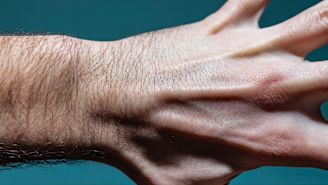Frozen shoulder, also known as adhesive capsulitis, can make even everyday chores seem almost impossible. “It’s the most painful [condition] that walks into my office,” says Carmelita Teeter, MD, out of Medical City Las Colinas and Medical City Alliance in Irving, Texas. “When somebody comes in with frozen shoulder, you need to validate the pain,” she adds.
What is frozen shoulder?
Frozen shoulder causes the temporary loss of a full range of motion in the shoulder. Your shoulder joint is made up of the upper arm (humerus), shoulder blade (scapula) and collarbone (clavicle); they’re all wrapped together in connective tissue. In a person with frozen shoulder, the grouping of bones, ligaments and muscles become too tight to move. It can take one to three years to fully recover from the effects of the condition. “Ask around and you'll discover that a lot of people you know have probably had it,” says Teeter.
Freezing, frozen and thawing
Frozen shoulder can be idiopathic (without cause) or can occur after an injury or surgery. Maybe you were an active runner, swimmer or dancer and one day had excruciating pain in the shoulder for seemingly no reason, or maybe you had shoulder surgery and it became immobilized from underuse. “The problem is that we don't really know what causes frozen shoulder,” says Dr. Teeter. Since it’s difficult to know what causes frozen shoulder, it’s also difficult to prevent it.
There are typically three frozen shoulder stages: Freezing, frozen and thawing.
- The first stage, freezing, can last anywhere between 6 weeks to 9 months, and usually worsens over time until range of motion is lost.
- During the second stage, frozen, the patient experiences less pain, but the shoulder is still stiff for about 4 to 12 months.
- In the final stage, thawing, the patient’s range of motion gradually improves but is not completely restored. This phase can last up to 24 months.
Unexpected risks
“Usually pretty active members of the community get frozen shoulder: Working teachers, doctors, lawyers or laborers,” says Teeter. Some factors which can increase your risk include:
- Diabetes: Frozen shoulder typically affects two to five percent of the population, but up to 10 to 20 percent of people with diabetes.
- Age and gender: It’s still unknown why women between the ages of 40 to 60 years old have a higher risk.
- Other health conditions: A stroke, heart disease, an underactive or overactive thyroid and depression can all predispose you.
- Previous injuries: If you neglect to mobilize an affected area after an injury, you risk getting frozen shoulder.
A tricky diagnosis
Diagnosing frozen shoulder is typically done through a physical exam. Your doctor will measure the range of motion in the shoulder and compare it to the other shoulder. You may also need an x-ray on the injured area to rule out conditions with similar symptoms, like bursitis. Ultrasounds and MRI scans can be used to look for any tears in the rotator cuff, as well.
Frozen shoulder therapy you can try from home
During the first frozen shoulder stage, it’s typically too painful to do any sort of strengthening exercises. However, Teeter suggests patients use their affected arm as much as possible. Engaging in everyday tasks can help with recovery. Some tasks include adjusting the shower head or putting light dishes away in cabinets. Something as simple as loading the dishwasher can release some tension. Because sleeping at night can be painful, use a heating pad before bedtime to warm the shoulder up. Low doses of over the counter pain-relievers can be helpful, too.
When the condition becomes less painful, usually during the second frozen shoulder stage, many patients are able to do some simple strengthening exercises. Teeter sometimes has patients walk their hands up a wall and stretch into their shoulders.
Talk to your doctor or physical therapist to see what sort of stretches and exercises work for your stage of frozen shoulder.
If the pain is not subsiding on its own, there are other treatment options. Your doctor may inject a corticosteroid into the joint to provide relief from inflammation. Generally, the percentage of people who undergo surgery is small.
Lifestyle modification tips
“People want to hear ‘If it hurts don't do it.’ But, the reality is that almost everything hurts, so it's better to try to use the shoulder as much as they can,” says Teeter.
Whether it’s frozen shoulder therapy, a simple lifestyle modification or a strengthening exercise, it’s possible to relieve some of the pain associated with this invisible condition.






